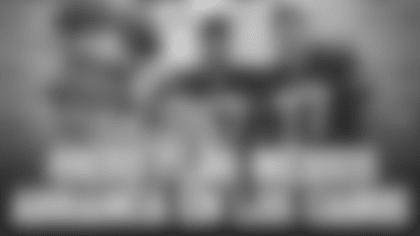Former White House press secretary Ari Fleischer, who served two and a half years under President George W. Bush is now running his own communications company geared towards sports.
"I give advice to sports people - executives, owners or players on how to deal with the media," explained Fleischer. "How to handle the toughest spot the media can put them in, and also how to work with the media, and how to respect them so that their career is enhanced and people know who they are and what they are doing."
Professional sports are not without their own set of politics, but the move from the political arena to the sports field may still seem like a bit of a leap.
Fleischer proclaimed differently on Tuesday evening when he addressed the San Francisco 49ers coaches and players.
"The only two institutions in our society that get the amount of focus, passion and intense coverage are the White House and the NFL," said Fleischer.
Head coach Mike Nolan had heard Fleischer speak similar words at the NFL owners meetings this spring and decided he would be a perfect speaker for his annual training camp lecture series. At least one speaker every summer is dedicated strictly to how to deal with the media, something that Fleischer possesses considerable knowledge of, and experience.
"I dealt with some of the toughest, most intelligent, sharpest reporters in the country and I loved it," said Fleischer. "I did it in a pretty tough time for our country. I did it for the Presidential recap in the year of 2000 when we didn't know who had won the election because it was that close. I did it on 9/11, I did it through war, and I did it through an Anthrax attack."
Fleischer visited with the 49ers to share the set of tools that allowed him to be successful in his many difficult, and sometimes combative dealings with the press. San Francisco marked the fourth NFL team Fleischer has shared his presentation with, and he plans to head to the Packers and the Browns next to preach his words of wisdom.
"My message is - you've got your head in the game on the field, don't ever take your head out of the game when you get in the locker room with reporters," said Fleischer. "There are pitfalls that players can fall into. My job is to help them avoid those pitfalls."
Fleischer shared a few newspaper clippings from recent sports coverage to illustrate some real life pitfalls that professional athletes face, and the subsequent headlines they should try to avoid at all costs.
His number one tip, "be honest."
"There is going to be a time in everybody's career where something happens that is a real pickle. They are going to be in some kind of jam or problem and you can never lie," said Fleischer. "You don't have to answer every question. You can say that you have the right to privacy, but if anybody opens up their mouth and says something to the press, they have an obligation to make it the truth."
At the end of his half-hour presentation, Fleischer opened it up for questioning, and then followed his own advice. Several 49ers players asked tough questions on a range of topics covering the war in Iraq, the conspiracy theories regarding 9/11, and the government's poor handling of Hurricane Katrina, and Fleischer candidly answered.
"A lot of the questions were historical, and then guys got into some of substance and the controversy about Iraq, which was really interesting that the players wanted to get into that," said Fleischer. "I'm not here to be political. I just try to shed light on why I did what I did, or why I said what I said, or what the President said and why."
Nolan eventually cut off the line of questioning so that the players could get to dinner and team meetings, but several players including Brian Jennings, Alan Reuber, Allen Rossum, Adam Snyder and Jeb Terry still stuck around for a few more.
"I've seen this before but there's a big crossover," said Fleischer. "People in sports love to talk about politics and people in politics love to talk about sports. If it's what you do every day for 12-15 hours a day, you get sick of it. I think for the players, there's some relief in having a break and raising other questions."
But more than the nice break, the goal of Fleischer's lecture is for the players to walk away with a few answers of their own the next time tough questions do arise.






